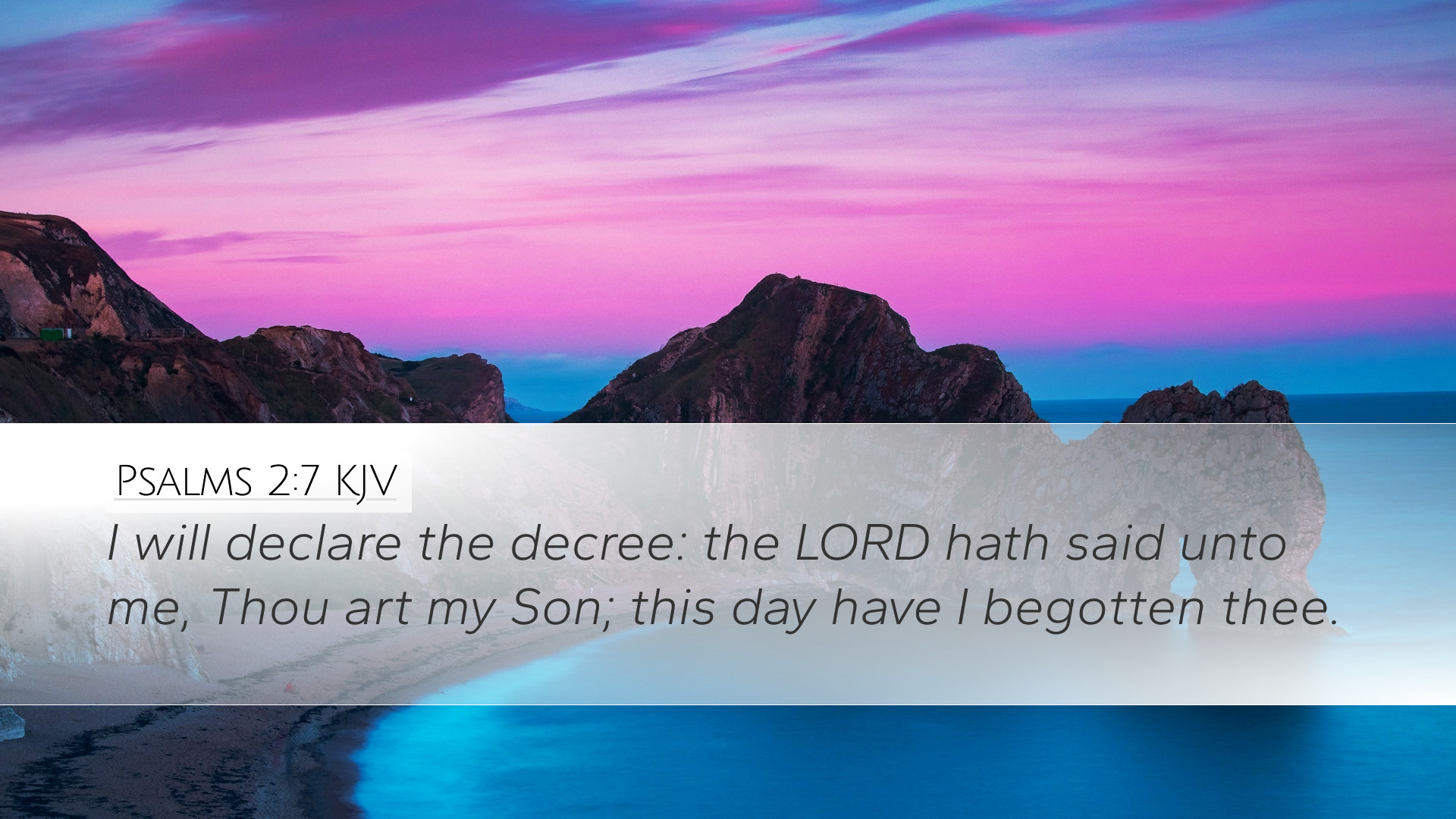Commentary on Psalms 2:7
Psalms 2:7: "I will tell of the decree: The LORD said to me, 'You are my Son; today I have begotten you.'
Introduction
The verse in Psalms 2:7 holds significant theological and prophetic implications. It presents the declaration of God's chosen King and relates to the Messianic context within the broader narrative of Scripture. Commentators through the ages have explored its meaning, exegesis, and application, particularly in light of New Testament revelation.
The Context of Psalms 2
This Psalm is considered a royal psalm, often read in the context of the coronation of a king in Israel, particularly focusing on the Davidic line. Matthew Henry notes the rebellion of nations against God's anointed and the establishment of His Kingdom. Such a rebellion reflects a universal tendency to resist divine authority. Henry emphasizes the futility of such opposition when faced with the divine decree of God's sovereignty.
Albert Barnes highlights the dialogue between the nations and God, capturing the struggle against divine authority. This context frames the significance of the declaration in verse 7 as a counter to the rebellion of the nations.
Analysis of "I Will Tell of the Decree"
In asserting "I will tell of the decree," the psalmist acknowledges the gravity of God's spoken word. Adam Clarke interprets this as an invitation to reveal the divine plan established in heaven. The term "decree" connotes a perpetual and irrevocable order, which cannot be thwarted by human opposition. This is a reaffirmation that the appointment of the King is divinely ordained, ensuring that God's authority prevails over any earthly power.
The Declaration: "You Are My Son"
The proclamation, "You are my Son," is pivotal to understanding the identity of the anointed one. Matthew Henry discusses the deep relational significance of this title. It confirms the intimate relationship between God and His appointed King. This reflects the Davidic covenant, where God promises a lineage that would reign forever—a promise fulfilled in Jesus Christ.
Albert Barnes points out the Christological implications of this verse. In the New Testament, this declaration is cited in relation to Jesus at His baptism and transfiguration, emphasizing His unique sonship and divine authority. This establishes Jesus as the ultimate fulfillment of the Messianic prophecy embodied in the psalm.
"Today I Have Begotten You"
The phrase "today I have begotten you" is a source of theological reflection and debate. Adam Clarke notes that this can be understood in a dual sense referring both to the coronation of the King and ultimately to the resurrection of Jesus Christ, marking His declaration as the Son of God in power (Romans 1:4). The use of "today" indicates a decisive event that alters the course of history.
This verse affirms the moment when God's decree becomes manifest in the person of the King. It symbolizes both a historical event and an ongoing reality in Christian faith, as Clarke opines, representing the eternal sonship of Christ and His divine role in salvation history.
Theological Implications
The theological depth of Psalms 2:7 extends further into Christology and Trinitarian thought. Matthew Henry posits that the declaration "You are my Son" encapsulates the essence of the God-man relationship, tying it back to the eternal nature of Christ as the Son within the Trinity. This invites scholars to explore the interconnectedness between the Old and New Testaments.
- Divine Sovereignty: The passage underscores God's sovereign control over history, a theme prevalent in the Psalms.
- Mediatorial Role of Christ: The verse highlights Jesus as the mediator who draws humanity into a reconciled relationship with God.
- Messianic Expectation: The psalm serves as a profound anticipatory text, shedding light on the hope of the Messiah that permeates the Scriptures.
Application for Pastors and Theologians
For pastors and theologians, Psalms 2:7 invites reflection on the nature of Christ's authority and the implications for ministry. The affirmations of God's sovereignty are essential affirmations in preaching and teaching. Whenever the gospel is proclaimed, the believer is reminded of the victory of Christ over opposition, an encouragement in times of tribulation.
Furthermore, the relational aspect of "You are my Son" encourages believers to explore their identity as children of God through Jesus, promoting a deeper sense of belonging and divine purpose.
Conclusion
Psalms 2:7 serves as a rich theological gem, intricate in its royal implications and profound in its Christological fulfillment. By intertwining insights from public domain commentaries, we have explored the multifaceted meanings of this verse. Future studies should continue to delve into how this proclamation shapes our understanding of God's redemptive plan through Jesus Christ, His Son, reinforcing the promises made throughout scripture.


